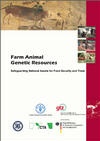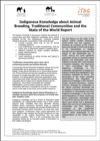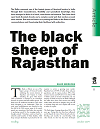Farm animal genetic resources: Safeguarding national assets for food security and trade
Summary of four workshops on livestock genetic resources held in Mozambique, Angola, Zambia and Swaziland.

Download document
Summary of four workshops on livestock genetic resources held in Mozambique, Angola, Zambia and Swaziland.

Leaflet advocating that indigenous knowledge, pastoralists and other traditional livestock keeping communities be recognized in policies and databases on livestock.

The Raika represent one of the largest groups of livestock herders in India. Through their innovativeness, flexibility and specialised knowledge, they have managed to thrive in a harsh, semi-desert environment. They have developed hardy livestock breeds and a complex social web that revolves around their animals. But external factors are pushing the Raika to the limits of their resourcefulness and threatening their livelihood with extinction.
